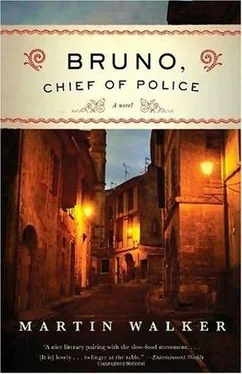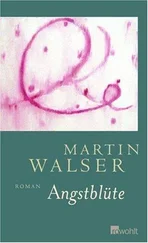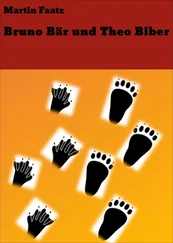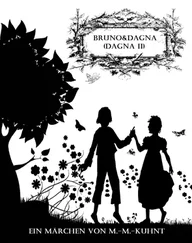Martin Walker - Bruno, chief of police
Здесь есть возможность читать онлайн «Martin Walker - Bruno, chief of police» весь текст электронной книги совершенно бесплатно (целиком полную версию без сокращений). В некоторых случаях можно слушать аудио, скачать через торрент в формате fb2 и присутствует краткое содержание. Жанр: Полицейский детектив, на английском языке. Описание произведения, (предисловие) а так же отзывы посетителей доступны на портале библиотеки ЛибКат.
- Название:Bruno, chief of police
- Автор:
- Жанр:
- Год:неизвестен
- ISBN:нет данных
- Рейтинг книги:3 / 5. Голосов: 1
-
Избранное:Добавить в избранное
- Отзывы:
-
Ваша оценка:
- 60
- 1
- 2
- 3
- 4
- 5
Bruno, chief of police: краткое содержание, описание и аннотация
Предлагаем к чтению аннотацию, описание, краткое содержание или предисловие (зависит от того, что написал сам автор книги «Bruno, chief of police»). Если вы не нашли необходимую информацию о книге — напишите в комментариях, мы постараемся отыскать её.
Bruno, chief of police — читать онлайн бесплатно полную книгу (весь текст) целиком
Ниже представлен текст книги, разбитый по страницам. Система сохранения места последней прочитанной страницы, позволяет с удобством читать онлайн бесплатно книгу «Bruno, chief of police», без необходимости каждый раз заново искать на чём Вы остановились. Поставьте закладку, и сможете в любой момент перейти на страницу, на которой закончили чтение.
Интервал:
Закладка:
‘You’re right. The past doesn’t die. Maybe it even keeps the power to kill.
Look, I have what I need now. I’ll take these books and leave you in peace. I have to get back to my office and get to work.’
‘Are you sure, Bruno? Don’t you need some food?’
He shook his head, picked up Christine’s books and took his leave. As he drove away he looked with new eyes at this placid countryside that had known such events, and known them within living memory. He thought of smoke in the sky from burning farms, blood on the ground from slaughtered fathers; he imagined French policemen giving the orders that deployed military convoys on the country roads – convoys packed with Arab mercenaries in black uniforms, with licence to rape, loot and pillage. He thought of half-starved young Frenchmen, hiding in the hills with only a handful of weapons, helplessly watching the reprisals unleashed against their families and their homes. Poor France, he thought. Poor Pйrigord. Poor Momu.
And, Bruno wondered, whatever can we do with the Frenchmen who took their long-delayed revenge against one of their tormentors? At least now he knew why a swastika had been carved into Hamid’s chest. It signified not the politics of the killers, but the real identity of the corpse.
Once back in St Denis, Bruno drove immediately to the Mayor’s house by the river on the outskirts of town, showed him Christine’s books and the photograph of young Boudiaf with Villanova, and explained why he now believed their dead Arab war hero had been in the Force Mobile. The Mayor was swiftly convinced, but agreed the chain of evidence had to be made solid. They sat down and, from memory, composed a partial list of all the families they knew in St Denis or the surrounding region who had been part of the Resistance. They could flesh out the list the next day from the records of the Compagnons de la Rйsistance in Paris.
‘So the police are now going to start investigating half the families of St Denis to see which of them might have known that Hamid had been in the Force Mobile. How the hell do we stop this getting out of hand, Bruno?’
‘I don’t know, Sir. I’m trying to think this through. They’ll question the old ones first, those who might have recognised Hamid. It could take weeks, a lot of detectives, and then the media and the politicians get involved. We could have a national scandal on our hands. We may need all your political connections to get the people in Paris to realise there can be no winners in this, nothing but a political nightmare when the right-wingers make hay about French families being burned out and terrorised by Arabs in German pay. Speaking personally, I’m so outraged by it I can hardly think straight, Sir.’
‘Stop calling me Sir, Bruno. We’ve been through too much for that and I don’t know what to do any more than you do. In fact, I trust your instincts on this better than my own. I’m too much the politician.’
‘Politics may be what we need to get through this. But I have to go and brief the investigation team.’
‘You haven’t told them yet? So they don’t know anything about the Force Mobile?’ the Mayor demanded, and then paused before continuing thoughtfully, ‘So we have some time to think how much to tell them.’
‘No time at all, Sir,’ Bruno said briskly. Determined to squash whatever thoughts might be stirring in the Mayor’s mind, he went on, ‘They know I’m working on this and Isabelle, the Inspector, has already been delving in the military archives about Hamid’s mysterious war record. They are close on that trail, and I have to go.’
Bruno left the Mayor sitting hunched and looking slightly shrunken in the rather over-decorated sitting room that was his wife’s great pride, and walked out to his van to call Isabelle. They met in his office at the Mairie where he laid out the evidence for her. Together they rang J-J and agreed to meet in Bordeaux the next morning. He phoned Christine at her Bordeaux hotel, got from her the mobile number of the curator of the Jean Moulin archives, and arranged for the next morning’s visit. He decided it was not his job to alert Tavernier. J-J could do that.
More depressed than he had ever felt, Bruno could not think of food, but Isabelle took him off to the local pizza restaurant where he ate mechanically and drank too much wine. Careless of the town’s gossips, she drove him home and put him to bed. She fed his chickens, undressed and climbed into bed beside him.
He awoke in the early hours, and she pushed him into the shower and put on a pot of coffee. Then she joined him under the steaming water and they made urgent love amid the soap suds, ending up passionately on the bathroom floor.
Later she brought the coffee and they went back to bed. There, they turned more gently to one another and were still engrossed in each other’s bodies when the cockerel crowed to signal the dawn – which made them both laugh and Bruno realised he felt human once more. They showered again, and Bruno watered his garden and fed Gigi, then made fresh coffee while Isabelle went back to her hotel to dress. She returned with a bag of fresh croissants from Fauquet’s and they took her car to Pйrigueux. Bruno kept his hand resting lightly on her thigh for the entire journey.
‘You’re a very remarkable woman,’ he told her as they reached the new motorway at Niversac. ‘That makes twice you’ve rescued me. And this time you did it even after you saw me drunk.’
‘You’re worth it,’ she said, taking his hand, putting it between her thighs and squeezing it. ‘And there’s another bad moment ahead, when you have to help us make the arrest. You’d better prepare yourself for that. Whatever Hamid was or whatever he did, he was unlawfully murdered.’
‘I know,’ he said. ‘But if it had been your family, your farm, your mother, you would have killed him yourself. That’s justice.’
‘It may be justice, but it’s not the law,’ she said. ‘You know that.’
Indeed he did know it, and it saddened him. Yet his sadness was of a different order to the despair that had gripped him the previous evening. That at least had lifted.
Bruno and Isabelle met J-J and a liaison officer from the Bordeaux police on the steps of the Centre Jean Moulin at nine a.m. Christine was already inside with the elderly French historian who ran the archives. The Centre was named after one of the most famous of France’s Resistance leaders, who had sought to unify Communists, Gaullists and patriots into a common command and had been betrayed to the Gestapo. It stood in the centre of the city, an elegant neo-classical building of white stone that hid the dark history within. Best known to the public as a museum of the Resistance, it contained showcases of domestic objects: wooden shoes, wedding dresses made of flour sacks, ration cards and other realities of daily wartime life. Also on show were bicycle-driven dynamos that produced electricity for clandestine radios, and cars with giant bags on the roof that contained carbon gas made from charcoal, to use in the absence of petrol. There were displays of the different contents of the weapons containers – Sten guns and bazookas, grenades and sticky bombs – dropped by British aircraft for use by the Resistance. Underground newspapers were laid out to read. And playing in the background was a discreet but continuous soundtrack of the songs they sang, from the love songs of Charles Aznavour to the defiant heroics of the Resistance anthem, Le Chant des Partisans.
But Bruno discovered that the real heart of the Centre Jean Moulin was to be found on its upper floors, which contained the written and oral archives and the research staff who worked there, keeping alive the memory of this tortured period of French history.
Christine and J-J sifted through the fragmentary records of the Force Mobile, and established that Hussein Boudiaf and Massili Barakine had been recruited to a special unit of the Milice in Marseilles in December 1942. After two months of basic training, they were assigned to the Force Mobile, a unit of a hundred and twenty men commanded by a Captain Villanova, which specialised in what were described as ‘counter-terrorist operations’ in the Marseilles region. In October of 1943, after the British and Americans had invaded Italy and knocked Hitler’s ally Mussolini out of the war, the Germans had spread the Occupation into the previous ‘autonomous’ zone run by the Vichy government, and the Force Mobile came under Gestapo rule. The outfit was expanded, and Villanova’s unit was assigned to Pйrigueux in February 1944, charged with taking ‘punitive measures against terrorist supporters’.
Читать дальшеИнтервал:
Закладка:
Похожие книги на «Bruno, chief of police»
Представляем Вашему вниманию похожие книги на «Bruno, chief of police» списком для выбора. Мы отобрали схожую по названию и смыслу литературу в надежде предоставить читателям больше вариантов отыскать новые, интересные, ещё непрочитанные произведения.
Обсуждение, отзывы о книге «Bruno, chief of police» и просто собственные мнения читателей. Оставьте ваши комментарии, напишите, что Вы думаете о произведении, его смысле или главных героях. Укажите что конкретно понравилось, а что нет, и почему Вы так считаете.












